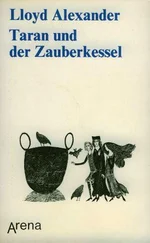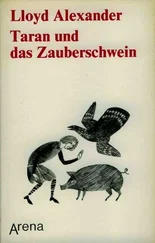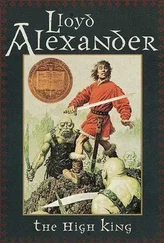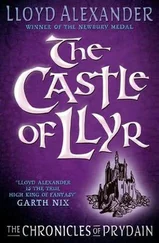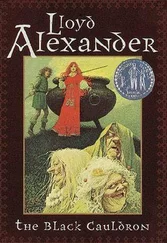"This may well serve," Hevydd told him confidently, despite the doubtful look Taran gave him.
Again Taran strode to the block and raised the sword. Doing his best to shatter the ungraceful weapon, he brought it down with all his strength. The blade rang like a bell. This time it was the block that split in two.
"Now," said Hevydd quietly. "That's a blade worth bearing."
Then he clapped his hands and seized Taran's arm. "You've strength in those chicken wings after all! You've proved yourself as well as you proved the blade. Stay, lad, and I'll teach you all I know."
Taran said nothing for a time, but looked, not without pride, at the new-forged blade. "You have already taught me much," he said at last to Hevydd, "though I lost what I had hoped to gain. For I had hoped I was indeed a swordsmith. I have learned that I am not."
"How then!" cried Hevydd. "You've the makings of an honest swordsmith, as good as any in Prydain."
"It cheers me to think that may be true," Taran answered. "But I know in my heart your craft is not mine. A spur drove me from Small Avren, and it drives me now. And so must I journey, even if I wished to stay."
The smith nodded. "You are well-named, Wanderer. So be it. I ask no man to go against his heart. Keep the blade in token of friendship. Yours it is, more so than any other, for you forged it with your own hands."
"It's not a noble weapon, and thus it suits me all the more," Taran laughed, glancing at the ungainly sword. "Lucky it was that I didn't have to make a dozen before it."
"Luck?" snorted Hevydd, as Taran and Gurgi took leave of him. "Not so! More labor than luck.
Life's a forge, say I! Face the pounding; don't fear the proving; and you'll stand well against any hammer and anvil!"
WITH HEVYDD THE SMITH waving a sooty hand in farewell, the companions traveled on, bearing northward along the rich valley of Great Avren. A few days of easy riding through pleasant countryside brought them to the edge of Commot Gwenith. Here, a shower suddenly began pelting down on them, and the wayfarers galloped for the first shelter they could find.
It was a cluster of sheds, stables, chicken roosts, and storehouses seeming to ramble in all directions, but as Taran dismounted and hastened to the cottage amid the maze of buildings, he realized all were linked by covered walkways or flagstoned paths, and whichever he followed would sooner or later have brought him to the doorway that opened almost before he knocked on it.
"Come in, and a good greeting to you!" called a voice crackling like twigs in a fire.
As Gurgi scuttled inside to escape the teeming rain, Taran saw a bent old woman cloaked in gray beckoning him to the hearth. Her long hair was white as the wool on the distaff hanging from her belt of plaited cords. Below her short-girt robe, her bony shins looked thin and hard as spindles. A web of wrinkles covered her face; her cheeks were withered; but for all her years she gave no sign of frailty, as though time had only toughened and seasoned her; and her gray eyes were sharp and bright as a pair of new needles.
"I am Dwyvach Weaver-Woman," she replied, as Taran bowed courteously and told her his name. "Taran Wanderer?" she repeated with a tart smile. "From the look of you, I'd say you've indeed been wandering. More than you've been washing. And that's clear as the warp and weft on my loom."
"Yes, yes!" cried Gurgi. "See loom of weavings! See windings and bindings! So many it makes Gurgi's poor tender head swim with twirlings and whirlings!"
Taran for the first time noticed a high loom standing like a giant harp of a thousand strings in a corner of the cottage. Around it were stacked bobbins of thread of all colors; from the rafters dangled skeins of yarn, hanks of wool and flax; on the walls hung lengths of finished fabrics, some of bright hue and simple design, others of subtler craftsmanship and patterns more difficult to follow. Taran gazed astonished at the endless variety, then turned to the weaver-woman of Gwenith.
"This calls for skill beyond anything I know," he said admiringly. "How is such work done?"
"How done?" The weaver-woman chuckled. "It would take me more breath to tell than you have ears to listen. But if you look, you shall see."
So saying, she hobbled to the loom, climbed to the bench in front of it, and with surprising vigor began plying the shuttle back and forth, all the while working her feet on the treadles below, hardly pausing to glance at her handiwork. At last she stopped, cocked her head at Taran, fixed him with her sharp gray eyes, and said, "Thus is it done, Wanderer, as all things are, each in its own way, thread by thread."
Taran's amazement had grown all the more. "This would I gladly learn," he said eagerly. "The craft of the swordsmith was not mine. Perhaps the craft of the weaver may be. I pray you, will you teach it to me?"
"That I will, since you ask," replied Dwyvach. "But mind you: It is one thing to admire a well-woven bit of cloth and another to sit yourself before the loom."
"My thanks to you," Taran exclaimed. "I'll not fear to labor at your loom. With Hevydd the Smith, I didn't shrink from hot iron or the flames of his forge, and a weaver's shuttle is a lighter burden than a smith's hammer."
"Think you so?" Dwyvach asked, with a dry chuckle that sounded like knitting needles clicking together. "Then what shall you weave to begin with?" she went on, eyeing him sharply. "Taran Wanderer you call yourself? Taran Threadbare would be more like it! Would you weave yourself a new cloak? Thus you'll gain something to put on your back, and I'll see what skill you have in your fingers."
Taran willingly agreed; but next day, instead of teaching him weaving, Dwyvach led the companions to one of her many chambers, which Taran saw full nearly to bursting with piles of wool.
"Tease out the thorns, pick out the cockleburs," the weaver-woman ordered. "Comb it, card it― carefully, Wanderer, or when your cloak is done you'll feel it's made of thistles instead of wool!"
The size of the task ahead of him made Taran despair of ever finishing, but he and Gurgi started the painstaking work, with Dwyvach herself lending a hand. The aged weaver-woman, Taran soon learned, had not only a tart tongue but a keen eye. Nothing escaped her; she spied the smallest knot, speck, or flaw, and brought Taran's attention to it with a sharp rap from her distaff to his knuckles. But what smarted Taran more than the distaff was to learn that Dwyvach, despite her years, could work faster, longer, and harder than he himself. At the end of each day Taran's eyes were bleary, his fingers raw, and his head nodded wearily; yet the old weaver-woman was bright and spry as if the day had scarce begun.
Nevertheless, the work at last was finished. But now Dwyvach set him in front of a huge spinning wheel. "The finest wool is useless until it's spun to thread," the weaver woman told him. "So you'd best begin learning that, as well."
"But spinnings are woman's toilings!" Gurgi protested. "No, no, spinnings are not fitting for bold and clever weaver-men!"
"Indeed!" snorted Dwyvach. "Then sit you down and learn otherwise. I've heard men complain of doing woman's work, and women complain of doing man's work," she added, fastening her bony thumb and forefinger on Gurgi's ear and marching him to a stool beside Taran, "but I've never heard the work complain of who did it, so long as it got done!"
And so, under Dwyvach's watchful eye, Taran and Gurgi spun thread and filled bobbins during the next few days. Chastened by Dwyvach's words, Gurgi did his best to help, though all too often the hapless creature managed only to tangle himself in the long strands. Next, Dwyvach took the companions to a shed where pots of dye bubbled over a fire. Here, Taran fared no better than Gurgi, for when the yarn was at last dyed, he was bespattered from head to toe with colors, and Gurgi himself looked like a rainbow suddenly sprouting hair.
Читать дальше

